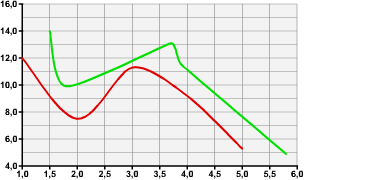Namespace: GlobFX.SwiffChartGenerator
Assembly: GlobFX.SwiffChartGenerator (in GlobFX.SwiffChartGenerator.dll)
Set series X values from data stored in a single-dimension array (for XY-Scatter and XY-Curves).
Public Sub SetSeriesXValuesFromArray( index As Integer, values As Array )
public void SetSeriesXValuesFromArray( int index, Array values );
Arguments
- index
- An integer value that specifies the zero-based index of the series in the chart object.
- values
- A single-dimension array containing the series X values as elements: double[], string[], DateTime[], int[], float[], byte[], sbyte[], short[], ushort[], uint[], long[], or ulong[].
Remarks
Note: This method is available when manipulating XY data series required for displaying XY-Curves and XY-Scatter. Note that the Chart type (ie: bar, column, line, etc.) is defined in the Swiff Chart style file (.scs) which must be loaded via the LoadStyle method.
The data stored in the array must be numerical values.
If the index argument refers to a series that does not exist in the chart object, the series is created.
- index must be superior or equal to 0.
Sample Code
The following code shows how to store the XY values of the table below using the SetSeriesXValuesFromArray method. This table has two series named "Year 2006" and "Year 2007". Each of these two series contains independant X values and Y values.
|

|
||||||||||||||||||||||||||||
Dim array_x(4) As Double Dim array_y(4) As Double array_x(0) = 1.0 array_x(1) = 2.0 array_x(2) = 3.0 array_x(3) = 4.0 array_x(4) = 5.0 array_y(0) = 12.0 array_y(1) = 7.5 array_y(2) = 11.3 array_y(3) = 9.2 array_y(4) = 5.3 ' Add the first series "Year 2006" chart.SetSeriesCaption( 0, "Year 2006" ) ' Fill the first series with XY values stored in the array variables chart.SetSeriesXValuesFromArray( 0, array_x ) chart.SetSeriesYValuesFromArray( 0, array_y ) array_x(0) = 1.5 array_x(1) = 1.8 array_x(2) = 3.7 array_x(3) = 3.9 array_x(4) = 5.8 array_y(0) = 14.0 array_y(1) = 9.9 array_y(2) = 13.1 array_y(3) = 11.5 array_y(4) = 4.9 ' Add the first series "Year 2007" chart.SetSeriesCaption( 1, "Year 2007" ) ' Fill the second series with XY values stored in the array variables chart.SetSeriesXValuesFromArray( 1, array_x ) chart.SetSeriesYValuesFromArray( 1, array_y )
double[] array_x= new double[5]; double[] array_y= new double[5]; array_x[0]= 1.0; array_x[1]= 2.0; array_x[2]= 3.0; array_x[3]= 4.0; array_x[4]= 5.0; array_y[0]= 12.0; array_y[1]= 7.5; array_y[2]= 11.3; array_y[3]= 9.2; array_y[4]= 5.3; // Add the first series "Year 2006" chart.SetSeriesCaption( 0, "Year 2006" ); // Fill the first series with XY values stored in the array variables chart.SetSeriesXValuesFromArray( 0, array_x ); chart.SetSeriesYValuesFromArray( 0, array_y ); array_x[0]= 1.5; array_x[1]= 1.8; array_x[2]= 3.7; array_x[3]= 3.9; array_x[4]= 5.8; array_y[0]= 14.0; array_y[1]= 9.9; array_y[2]= 13.1; array_y[3]= 11.5; array_y[4]= 4.9; // Add the first series "Year 2007" chart.SetSeriesCaption( 1, "Year 2007" ); // Fill the second series with XY values stored in the array variables chart.SetSeriesXValuesFromArray( 1, array_x ); chart.SetSeriesYValuesFromArray( 1, array_y );
See Also
SeriesCount Property | SetSeriesXValuesFromString Method | SetSeriesCaption Method | GetSeriesXValue Method
Applies To: Chart Object